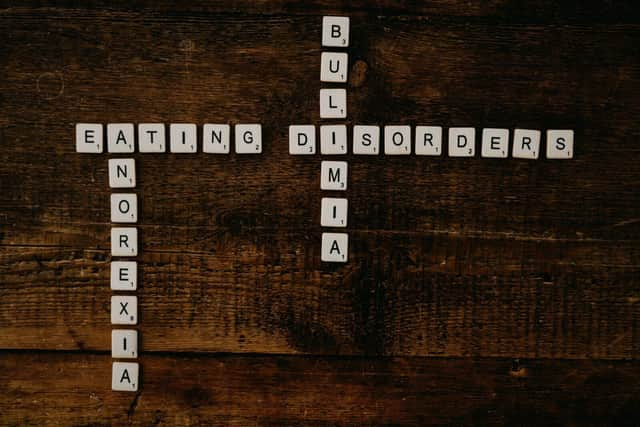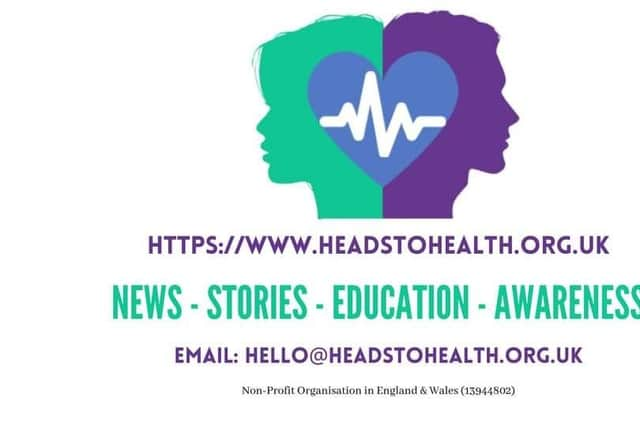Column - Eating Disorders: Not Just About Food
and live on Freeview channel 276
Actions and behaviours that may appear slightly peculiar or perhaps even 'quirky' at first - such as an obsessive focus on healthy eating, or an extreme aversion to eating in public - might actually be tell-tale signs of an underlying eating disorder. It's about looking beneath the surface and peeling back the layers to reveal the hidden struggles that your loved ones may be dealing with.
However, recognition is just the beginning. After recognising the warning signs, it's important to offer unflinching support and understanding. Encourage them to seek professional help; a multidimensional approach to treatment that includes mental health counselling and clinical interventions can often help to mitigate the impact of these disorders.
Advertisement
Hide AdAdvertisement
Hide AdThe bottom line is clear: eating disorders often mask underlying mental distress. By educating ourselves, we stand a better chance of recognising these disorders within our loved ones. As a result, you're more equipped to support them on their journey to recovery. And ultimately, your understanding and awareness could be the first ray of hope they see in their battle against their hidden struggles.


Breaking the Stereotypes: Unravelling the Complexities of Eating Disorder
We often harbour preconceived notions about eating disorders, picturing them solely as extreme cases of under or overeating. But understanding their complexities is crucial to recognise their often overlooked connection to mental distress.
Eating disorders are multifaceted ailments. They cannot be simply categorised and are much more than an unhealthy relationship with food. They are, in fact, serious mental health conditions that often go hand in hand with anxiety, depression, and even obsessive-compulsive disorder.
Consider this: Is your loved one shrinking away from meals, displaying unusual food behaviours, or experiencing an intense fear with gaining weight? These could be tell-tale signs of eating disorders. Remember, an eating disorder may not necessarily transform a person’s physique drastically, leading to subtler signs that can easily go unnoticed.
Advertisement
Hide AdAdvertisement
Hide Ad

Moreover, while it may seem that anyone can fall prey to these disorders, certain individuals may be more susceptible. Adolescents and young adults, for instance, often confront body image issues and social pressures that make them more vulnerable to eating disorders.
Understanding the intricate nature of eating disorders will help dispel common misconceptions. It takes us a step closer towards identifying the signs early, providing the necessary support, and initiating timely intervention. After all, the mental distress hiding behind these disorders is every bit as damaging as their physical manifestations, if not more.
-
Eating disorders have the highest mortality rate of any mental illness.
-
Anorexia nervosa has the highest mortality rate of any psychiatric disorder.
-
Bulimia nervosa affects 1-2% of adolescent and young adult women.
-
Binge eating disorder is the most common eating disorder in the United States.
-
Eating disorders can develop at any age, but typically begin in adolescence or early adulthood.
Beyond the Plate: Exploring the Emotional Triggers of Eating Disorders
When you dig into the depths of eating disorders, it quickly becomes apparent that these conditions are far more convoluted than simple food-related issues. Going 'beyond the plate' allows us to penetrate the emotional landscape of individuals struggling with eating disorders, which are often rooted in profound mental distress.
Research has revealed that emotional triggers, including stress, anxiety, depression, feelings of inadequacy or trauma, can precipitate the onset of an eating disorder. Those affected may use food as a coping mechanism – perhaps eating too little, too much, or adopting harmful behaviours such as purging after a meal. Therefore, these disorders are not simply about what's on the plate or how one looks in the mirror; they are about an internal battle raging inside the individual's mind.
Advertisement
Hide AdAdvertisement
Hide AdAs caring loved ones, it's essential to recognise the signs and be empathetic, sensitive, and open-minded. By identifying the emotional triggers, we're able to provide not just a sympathetic ear but also necessary mental health support. By offering a safe space for communication without judgement or blame, we can assist in defusing the emotional distress that fuels the disorder.
So, the next time you suspect a loved one might be grappling with an eating disorder, go beyond the food. Ask about their day, their feelings and their stress levels. It may be a difficult conversation, but it could be the first step in acknowledging the mental distress behind the eating disorder and seeking timely help.
A Cry for Help: How Eating Disorders Can Signal Deeper Mental Health Issues
Eating disorders are more than just extreme dieting; they're a loud cry for help, often signalling underlying mental health issues. We frequently misread these signs, attributing them purely to food. Nonetheless, it's important to comprehend the profound psychology at play.
Those battling with eating disorders are often grappling with distress much deeper than it appears on the surface. Their struggle with food is a manifestation of their attempt to regain control and suppress emotional pain. If you notice that a loved one's eating habits and attitudes towards food have drastically changed, it's alarm bells ringing. They may be silently screaming for help amidst their internal turmoil.
Advertisement
Hide AdAdvertisement
Hide AdAnorexia nervosa, bulimia nervosa, and binge eating disorders are among the most common and well-known eating disorders. Each carries its unique signs but shares a common thread — intense fear and dissatisfaction with body image, low self-esteem, and the association of self-worth with body shape. Recognising these signs is the first step towards helping your loved one.
Remember, it's not about the food. Unravel these intricate layers of complexities, and you'll realise it's the mind distressed. They may feel lonely, anxious, or depressed, giving the disorder more fuel. Reach out to them with understanding, compassion, and professional help. Suppose a conversation about their eating habits makes them defensive, withdrawn, or aggressive. In that case, it's a definite indication of a deeper mental health issue.
Understanding and recognising these signs of distress is crucial in helping your loved ones solve their eating disorders. Give them the needed support, but don't forget that professional assistance is necessary for full recovery. The sooner we start breaking the stereotypes around eating disorders being 'just about dieting', the sooner we would restore our loved ones' happiness and health.
The Power of Perception: How Society's Ideals Contribute to Eating Disorders
You're aware of how societal norms and standards can influence our behaviours and thoughts, aren't you? Well, when it comes to eating disorders, it's no different. Society's complex and often conflicting ideals significantly impact our perceptions of body image and indirectly contribute to the growing prevalence of these disorders.
Advertisement
Hide AdAdvertisement
Hide AdOne major flashpoint is the omnipresent beauty and fitness standards. They champion a particular body type or size, and often imply that one's worth is tied to their appearance. This implicit message can be incredibly harmful, as individuals may start falling prey to extreme dietary measures and unhealthy obsessions in an attempt to 'fit in'.
Media also fuels these perceptions by glorifying unrealistically slim or muscular bodies. Celebrities become templates of 'perfection', creating a false impression that such body types are normal, desirable, and achievable. These, combined with the fear of disapproval, can cause severe mental distress, leading to eating disorders such as anorexia or bulimia nervosa.
Furthermore, the societal stigma attached to mental health problems and their treatments can make matters much worse. People struggling with eating disorders may hesitate to seek professional help because of the fear of judgement or misunderstanding, which exacerbates the problem. So, it's crucial to understand these issues, not blame the affected individual, and offer supportive assistance.
We must remember - confronting and dismantling society's unhealthy ideals is a collective requirement. Only then can we hope to reduce the development and progression of eating disorders stemming from these perceptions.
Advertisement
Hide AdAdvertisement
Hide AdYour Questions:
How can I support someone with an eating disorder?
Supporting a loved one with an eating disorder starts with your willingness to understand the depth of their struggle. Acknowledging that their situation is more than just about physical appearance or eating habits is the first step. Understand that this is a sign of mental distress. Recognise that eating disorders are complex and multifaceted issues.
It's important for you to offer support without intruding or trying to fix things instantly. Be accessible and non-judgemental. Listen more and advise less. Ensure they know you're there for them, without pushing them to confide or share more than they're comfortable with.
Keep in mind that professional help is crucial in these situations. Encourage them to consult mental health professionals. Provide help in seeking the right services, specialists, and support groups. Never make them feel coerced; allow them to take their own time.
Stay patient and refrain from expecting immediate change. Recovery from eating disorders is a long journey and will require your continued support and understanding. Remember, your role is to provide emotional backing, not to cure the disorder. Leave that to the professionals.
Advertisement
Hide AdAdvertisement
Hide AdWhat resources are available for individuals with eating disorders?
For individuals grappling with eating disorders, a diverse range of resources is available. Specialists such as psychologists, dieticians, and physicians can provide medical and therapeutic support. Community support groups, either in-person or online, can offer a peer network of understanding and empathy.
Educational materials, including self-help books and online resources such as websites and forums, supply crucial information. Digital mental health platforms could be another avenue for support.
Services from established organisations like the National Eating Disorder Association (NEDA) and Beat Eating Disorders offer helplines, online support groups, and referral services to appropriate treatment options. You are encouraged to direct your loved ones to these resources, thereby facilitating their recovery journey.
To get in contact with the National Eating Disorder Association (NEDA), you may visit their official website. There, you can access various resources and can utilise their toll-free helpline at 1-800-931-2237. For Text Crisis services, text 'NEDA' to 741741.
Advertisement
Hide AdAdvertisement
Hide AdBeat Eating Disorders can be reached via their website as well. They provide helplines for adults (0808 801 0677) and for youths (0808 801 0711). An additional Student-line number (0808 801 0811) is also available. Get in touch via email at [email protected] for general enquiries and support.
Are there any support groups for families of individuals with eating disorders?
Yes, there are numerous support groups available for families of individuals with eating disorders. These groups provide a safe space for sharing experiences, gaining emotional support, accessing helpful information, and learning coping strategies.
Organisations such as Beat (UK) and the National Eating Disorders Association (US) run such support groups. Some are in-person, others are online, allowing you to select the one that fits your circumstances best.
What are some misconceptions about eating disorders?
Many common misconceptions about eating disorders exist.
The first is that such disorders only affect young, affluent, white females. This is not the case. Eating disorders can and do affect anyone, irrespective of age, race, gender, or socio-economic status.
Advertisement
Hide AdAdvertisement
Hide AdAnother false belief is that eating disorders are a choice or a diet gone wrong. In reality, they are serious mental health disorders, often linked to underlying issues such as anxiety, depression, or trauma.
A third misconception is that an individual must be visibly underweight to be suffering from an eating disorder. This is not true. Those with eating disorders can be underweight, average weight, or overweight; physical appearance is not a reliable indicator of the presence of an eating disorder.
Finally, a frequent mistake is believing that one can overcome an eating disorder through sheer willpower alone. The truth is, successful recovery often requires professional help and support, alongside medical and psychological treatment.